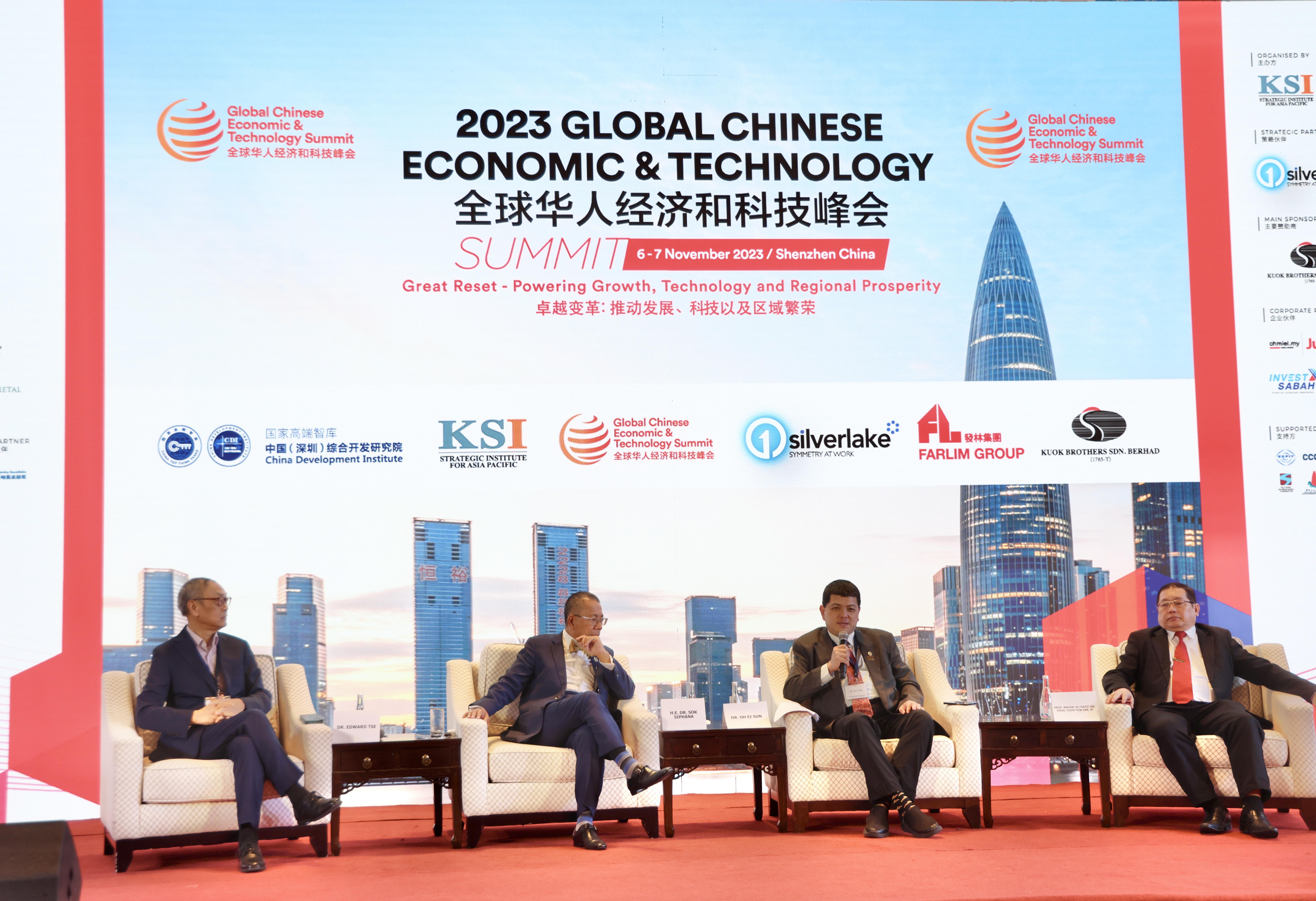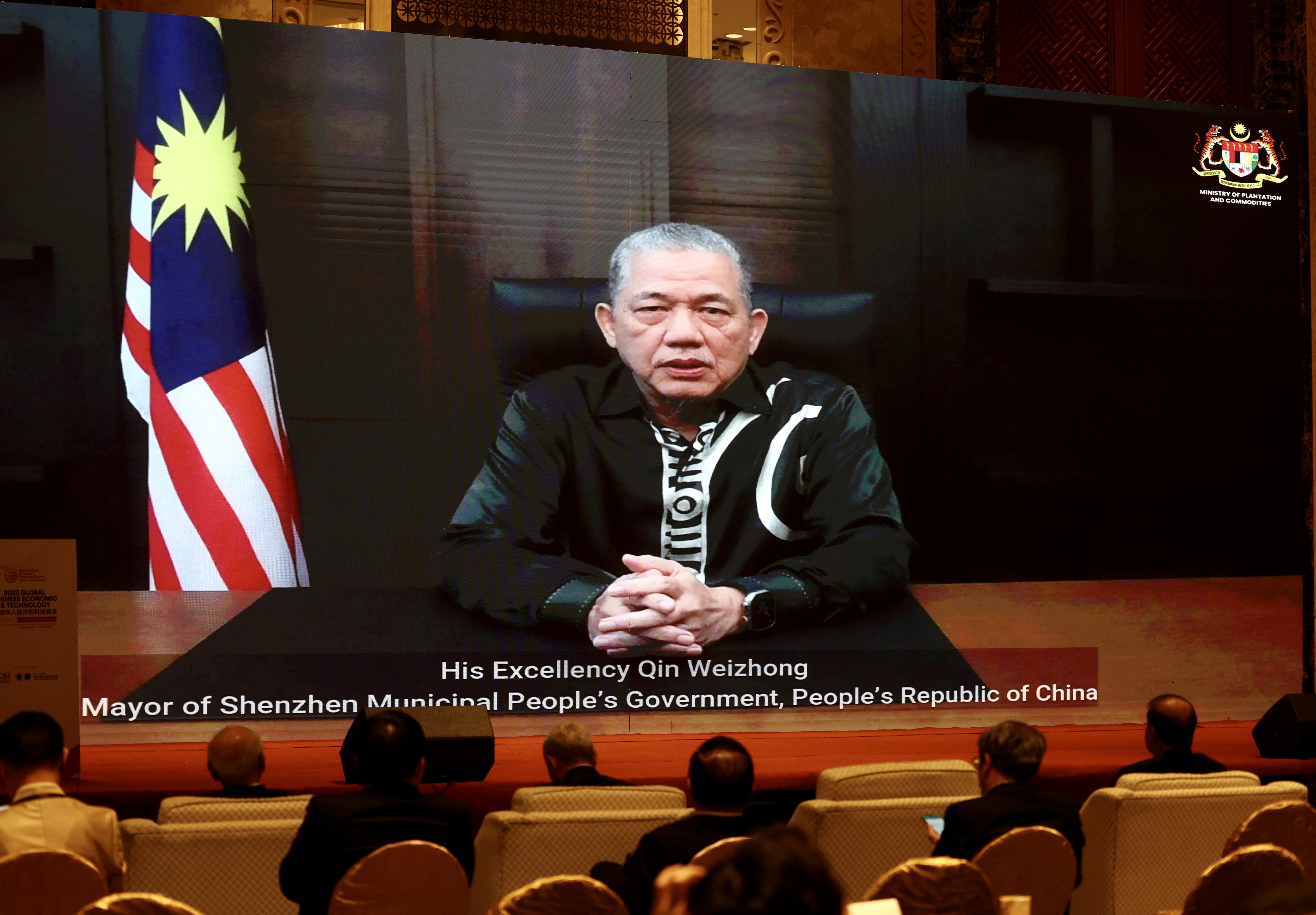 Guests attend a panel session during the 2023 Global Chinese Economic & Technology Summit at Futian Shangri-La Hotel, Shenzhen, China, on Nov 7, 2023 (EDMOND TANG / CHINA DAILY)
Guests attend a panel session during the 2023 Global Chinese Economic & Technology Summit at Futian Shangri-La Hotel, Shenzhen, China, on Nov 7, 2023 (EDMOND TANG / CHINA DAILY)
China and the Association of Southeast Asian Nations (ASEAN) have managed to set an example of uniting efforts to recover the economy and embracing a new cooperative globalization, experts noted at a Shenzhen forum on Tuesday.
This year marks several significant milestones in the shared history of Malaysia and China, Malaysia’s Deputy Prime Minister Haji Fadillah bin Haji Yusof said in a video link address at the opening ceremony of the 2023 Global Chinese Economic & Technology Summit (GCET).
Malaysia and China are celebrating the 10th anniversary of their Comprehensive Strategic Partnership, he said, highlighting the depth and breadth of bilateral relations.
In 2022, ASEAN's total merchandise trade with China reached a staggering $722 billion, reflecting a year-on-year growth of 7.8 percent and securing China's position as ASEAN's largest trading partner for the 14th consecutive year since 2009
“We also champion the vision for a closer China-ASEAN community with a shared future, an aspiration articulated by President Xi Jinping himself,” he said.
“Alongside these milestones, we commemorate the decade-long journey of the Belt and Road Initiative (BRI) and the 20th anniversary of China's accession to the Treaty of Amity and Cooperation in Southeast Asia.”
ALSO READ: Powering growth, technology and regional prosperity
The unwavering commitment from both sides has resulted in substantial economic benefits for the region, Fadillah Yusof said.
Concurrently, foreign direct investment flows from China to ASEAN recorded a stellar performance of $15.3 billion in 2022, Fadillah Yusof said. This is equivalent to 6.9 percent of total FDI flows to ASEAN, placing China as the fourth largest source of FDI among ASEAN's Dialogue Partners.
ASEAN’s 10 Dialogue Partners are Australia, Canada, China, the European Union, India, Japan, the Republic of Korea, New Zealand, Russia, and the United States.
In 2022, ASEAN's total merchandise trade with China reached a staggering $722 billion, reflecting a year-on-year growth of 7.8 percent and securing China's position as ASEAN's largest trading partner for the 14th consecutive year since 2009.
The two-day GCET Summit – themed "Great Reset: Powering Growth, Technology, and Regional Prosperity" – brought together a diverse group of thought leaders, business magnates, and government officials from around the world on Nov 6-7.
 The Rt. Hon. Dato' Sri Haji Fadillah Haji Yusof, the deputy prime minister of Malaysia, delivers a speech via video link during the 2023 Global Chinese Economic & Technology Summit at Futian Shangri-La Hotel, Shenzhen, China, on Nov 7, 2023 (EDMOND TANG / CHINA DAILY)
The Rt. Hon. Dato' Sri Haji Fadillah Haji Yusof, the deputy prime minister of Malaysia, delivers a speech via video link during the 2023 Global Chinese Economic & Technology Summit at Futian Shangri-La Hotel, Shenzhen, China, on Nov 7, 2023 (EDMOND TANG / CHINA DAILY)
“At present, the world's economic and political relations are in turmoil, and the pattern of global politics and economics is transforming,” Fan Gang, president of the China Development Institute told the summit. “China's economy is undergoing some major changes, so Chinese entrepreneurs pay a lot of attention to the development.”
According to Fan, the rate of Chinese economic growth is experiencing a relative slowdown, which is caused by both short-term and long-term factors. These include such factors as geopolitics, including Sino-US tensions.
However, there is still huge potential due to China’s advanced artificial intelligence (AI) and biotechnology sectors, as well as increasing urbanization trends and the growth of city clusters.
High-level opening-up can further promote China's development, he said, adding that he hopes “Chinese businessmen and enterprises will seize the business opportunities and achieve better development in such a turbulent world.”
ALSO READ: China-ASEAN ties to deepen further
Currently, we live “in different and trying times with conflicts and wars in the Middle East and Eastern Europe”, said Michael Yeoh, organizing chairman of the GCET Summit and KSI president.
Yeoh noted a new multilateral order and a new cooperative globalization is emerging with China playing a major role in shaping the new world order. “Hence, this is a time for renewed cooperation and collaboration. Building trust and confidence is essential,” he said.
In the aftermath of the global pandemic, the importance of global partnership, guidance, and cooperation has been accentuated, said Zhou Li, publisher and editor-in-chief of China Daily Asia Pacific
Digital inclusion is necessary to bridge the digital divide and ensure no one is left behind, Yeoh said, noting the increasingly critical role AI and Big Data are playing for nations and individuals.
“China’s leadership in digital and green technology can benefit ASEAN,” he said.
In the aftermath of the global pandemic, the importance of global partnership, guidance, and cooperation has been accentuated, said Zhou Li, publisher and editor-in-chief of China Daily Asia Pacific.
“In a world riddled with geopolitical tensions and economic challenges, the way forward resides in cultivating robust collaboration and partnerships, particularly between China and ASEAN,” Zhou said.
Technology, in all its forms – digital, green, health, and agrotechnology – has emerged as a critical game changer, driving the global economy and being integral to sustainable development, he noted.
“We gather in the vibrant city of Shenzhen, a luminary of technological advancement and economic prosperity, to engage in meaningful conversations that promise to shape our collective future,” Zhou said.
 Zhou Li, the publisher and editor-in-chief of China Daily Asia Pacific, delivers a welcoming speech during the 2023 Global Chinese Economic & Technology Summit at Futian Shangri-La Hotel, Shenzhen, China, on Nov 7, 2023 (EDMOND TANG / CHINA DAILY)
Zhou Li, the publisher and editor-in-chief of China Daily Asia Pacific, delivers a welcoming speech during the 2023 Global Chinese Economic & Technology Summit at Futian Shangri-La Hotel, Shenzhen, China, on Nov 7, 2023 (EDMOND TANG / CHINA DAILY)
Since its founding in 2009, the World Chinese Economic and Technology Summit has evolved into a global stage, bridging the global Chinese diaspora and nurturing a mutual understanding between the East and West.
“Whether it's the lively lanes of Malaysia, the historical city of London, the cultural center of Melbourne, or the bustling metropolis of Beijing, this platform has navigated a significant journey, sailing together through the winds of change,” Zhou added.
Vincent Lo, honorary chairman of the GCET Summit and chairman of Shui On Group, a Hong Kong-based property firm, said: “We are living in a volatile, chaotic, uncertain world – this is something we haven't seen since the Second World War. We have huge political problems, wars, high inflation, high interest rates, low growth."
Lo, also former chairman of the Hong Kong Trade Development Council, noted China has taken the lead and invested billions into many projects in the Belt and Road partner countries.
ALSO READ: Wang: China, ASEAN to build community with shared future
“I believe we must gather and integrate resources from all over the world to work on economically viable and bankable projects to ensure this brilliant initiative will continue to expand and grow and bear fruits for all,” Lo said.
There are so many divisions in the world, we must take the lead to break the lockjam to build a better future for our descendants, he said.
Lee Kim Yew, founder and patron of the GCET Summit, noted that Chinese President Xi Jinping first put out the notion of a “Community of Shared Future for Mankind” and the BRI to benefit not only China but the rest of the world.
Ahmad Fuzi bin Haji Abdul Razak, head of state of Malaysia’s Penang state, introduced the country’s transformative journey before he delved deeper into broader China-ASEAN relations and their shared vision.
He said from its roots as a primary commodities exporter, Malaysia has taken great strides but it has faced new challenges and new opportunities.
 H.E. Tun Dato' Seri Utama Ahmad Fuzi bin Haji Abdul Razak Yang di-Pertua Negeri of the State of Penang, Malaysia, delivers a speech during the 2023 Global Chinese Economic & Technology Summit at Futian Shangri-La Hotel, Shenzhen, China, on Nov 7, 2023 (EDMOND TANG / CHINA DAILY)
H.E. Tun Dato' Seri Utama Ahmad Fuzi bin Haji Abdul Razak Yang di-Pertua Negeri of the State of Penang, Malaysia, delivers a speech during the 2023 Global Chinese Economic & Technology Summit at Futian Shangri-La Hotel, Shenzhen, China, on Nov 7, 2023 (EDMOND TANG / CHINA DAILY)
“Our vision is to transform Malaysia into a high-income economy by 2030. For this, a strategic pivot is required,” Ahmad Fuzi said.
“We can no longer rely solely on low-skilled, labor-intensive industries. The need of the hour is to invest in high value-added sectors, enhancing our total factor productivity,” he said. “It is in this context that our partnerships, especially with China, become ever more critical.”
According to Ahmad Fuzi, the relationship between China and the ASEAN nations has evolved significantly over the years.
READ MORE: ASEAN eyes closer China ties
“From historical ties and cultural exchanges to economic collaborations and strategic partnerships, the interactions between China and the ASEAN bloc have become a cornerstone of regional peace, stability and development,” he said.
Chhem Kieth Rethy, a Cambodian senior minister, said in this world marked by geopolitical tensions and geo-economic challenges, collaboration and partnerships between China and ASEAN have never been more critical.
“Rising uncertainties and vulnerabilities compel us to come together to shape a better world and a shared future,” he said.


